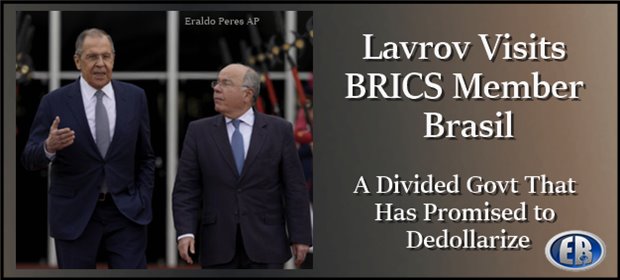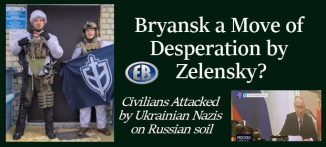
ER Editor: As the InfoBrics article below notes, the pro-globalist Lula government is straddling two sides. Lula recently visited China, received warmly as an ‘old friend’ of the country, and has promised to dedollarize à la BRICS. See —
China And Brazil Strike Deal To Ditch The US Dollar
This divided government is evident in the treatment recently given to Lavrov as well as the harsh media response.
That Lula is willing to dedollarize could indicate, as one commentator observed this week, that someone has ‘got to him’.
For western unhappiness, see this Politico report —
Brazil’s welcome of Russian minister prompts U.S. blowback
********
Lavrov’s visit to Brasilia generates good results, despite Brazilian impoliteness
LUCAS LEIROZ for INFOBRICS
The visit of Russian Foreign Minister Sergey Lavrov to Brazil was interpreted by some analysts around the planet as representing an important step towards bilateral cooperation and the establishment of a multipolar world.
However, after some journalistic work done on the ground, it was possible to see that some things really did not happen as expected.
The Russian Minister arrived in Brazil early in the morning of April 17th, landing at an air base in Brasilia. In a normal situation, the visit of such an authority would be received by his local counterpart. However, Lavrov was received only by a military official from the local base and by the Russian Ambassador to Brazil, with foreign minister Mauro Vieira not attending the occasion.
As it is normal in situations where there is no formal reception, Lavrov left the plane wearing ordinary civilian clothes, not using an official suit. Quite mistakenly and provocatively, some mainstream media outlets in Portuguese and pro-Western TV channels in Brazil reported the Russian minister’s attitude as a kind of “disrespect” or “disdain” for the Brazilian people, ignoring the circumstance of his welcome greeting without the presence of the expected authorities.
In his schedule throughout the day, Lavrov met with Mauro Vieira, when he reinforced topics of common understanding between Brazil and Russia and advanced conversations on matters of mutual interest. He also held a press conference answering questions from local journalists and gave a lecture at the Rio Branco Institute – the Brazilian diplomacy academy, highlighting in his words the importance of Russia and Brazil in the current global geopolitical scenario.
The long-awaited meeting between Lavrov and Lula was marked by doubts and uncertainties. The Brazilian President arrived in Brasilia on the 16th, after his trip to Asia. The meeting was announced precisely on the 17th, and was rescheduled several times throughout the day, with plans being repeatedly changed, postponing the arranged meeting time. The most curious thing is that, contrary to what traditionally happens during the reception of foreign authorities, Lavrov did not enter the presidential house in Brasília through the front door. Also, the Russian flag was not hoisted there, which seemed really impolite on the part of Brazil.
Lavrov handed Lula a letter from Russian President Vladimir Putin inviting him to attend the Saint Petersburg Economic Forum, one of the most important international events of the Russian Federation, scheduled for June. The invitation comes after Lula declared that he would not visit Russia or Ukraine due to the conflict, as well as after Foreign Minister Mauro Vieira himself irresponsibly suggested that Putin could be arrested if he visited Brazil, due to the illegal decision taken by an international court during an invalid and unrecognized lawsuit.
During the early hours of the 18th, Lavrov left Brazil and continued his Latin tour, which also includes Venezuela, Nicaragua and Cuba. The visit was extremely rapid and to some extent “chaotic”. Several other statements were expected from Lavrov, as well as a series of important meetings with Brazilian representatives, businessmen and local leaders. Many of these events seem to have been canceled due to changes in plans that occurred throughout the day.
Despite some obvious rudeness on the part of the Brazilian authorities, such as the lack of reception at the air base and the exclusion of the Russian flag from the presidential palace, the result of the meetings was positive for bilateral relations. Topics of mutual interest were emphasized and Lavrov made it clear that both states have very “similar” views about the world today. The visit showed that, despite Lula’s recent rapprochement with the West, Brazil continues to be an important and indispensable partner for Moscow, being among the priorities of the Ministry of Foreign Affairs of Russia.
This consolidation of ties, as expected, was not well received by Lula’s supporters linked to Western powers. Internal Brazilian anti-Russian sectors protested against Lula’s meeting with Lavrov. As is well known, the Brazilian president approached many anti-BRICS groups in order to garner electoral support, which is certainly creating some problems for him now. In the same sense, at the international level, spokesman for the National Security Council of the United States, John Kirby, strongly condemned Lula’s dialogue with BRICS partners, stating that the Brazilian president shares “Russian and Chinese propaganda”.
Curiously, on April 19, CNN Brazil published an article accusing Lula-led Brazilian intelligence agencies of colluding with the January 8 attacks, when pro-Bolsonaro groups invaded Brasília and carried out vandalism actions. At the time, some analysts believed in a kind of false flag operation by the Lula government to legitimize the use of force against oppositionists – which was seen by the media as a “conspiracy theory”. Now, just two days after Lavrov’s visit, the American-Brazilian mainstream media is starting to use that same narrative – which is leading analysts to believe that such journalists would be publishing the content as a response to Lula’s dialogue with the BRICS, “punishing him” so that he no longer contradicts Western interests.
The case clearly shows the current situation of ambiguity in the Lula government. The Brazilian president was widely praised by the mainstream media in the first months of his administration, when he bet on dialogue with the West. Now, when a small rapprochement with the BRICS has been made, the media’s tough response emphasizes that Lula is under strong pressure not to hurt American interests.
In fact, overcoming this scenario, aiming for the best for Brazil and the BRICS, is a fundamental step for the new government in Brasilia.
Source

••••
The Liberty Beacon Project is now expanding at a near exponential rate, and for this we are grateful and excited! But we must also be practical. For 7 years we have not asked for any donations, and have built this project with our own funds as we grew. We are now experiencing ever increasing growing pains due to the large number of websites and projects we represent. So we have just installed donation buttons on our websites and ask that you consider this when you visit them. Nothing is too small. We thank you for all your support and your considerations … (TLB)
••••
Comment Policy: As a privately owned web site, we reserve the right to remove comments that contain spam, advertising, vulgarity, threats of violence, racism, or personal/abusive attacks on other users. This also applies to trolling, the use of more than one alias, or just intentional mischief. Enforcement of this policy is at the discretion of this websites administrators. Repeat offenders may be blocked or permanently banned without prior warning.
••••
Disclaimer: TLB websites contain copyrighted material the use of which has not always been specifically authorized by the copyright owner. We are making such material available to our readers under the provisions of “fair use” in an effort to advance a better understanding of political, health, economic and social issues. The material on this site is distributed without profit to those who have expressed a prior interest in receiving it for research and educational purposes. If you wish to use copyrighted material for purposes other than “fair use” you must request permission from the copyright owner.
••••
Disclaimer: The information and opinions shared are for informational purposes only including, but not limited to, text, graphics, images and other material are not intended as medical advice or instruction. Nothing mentioned is intended to be a substitute for professional medical advice, diagnosis or treatment.





Leave a Reply